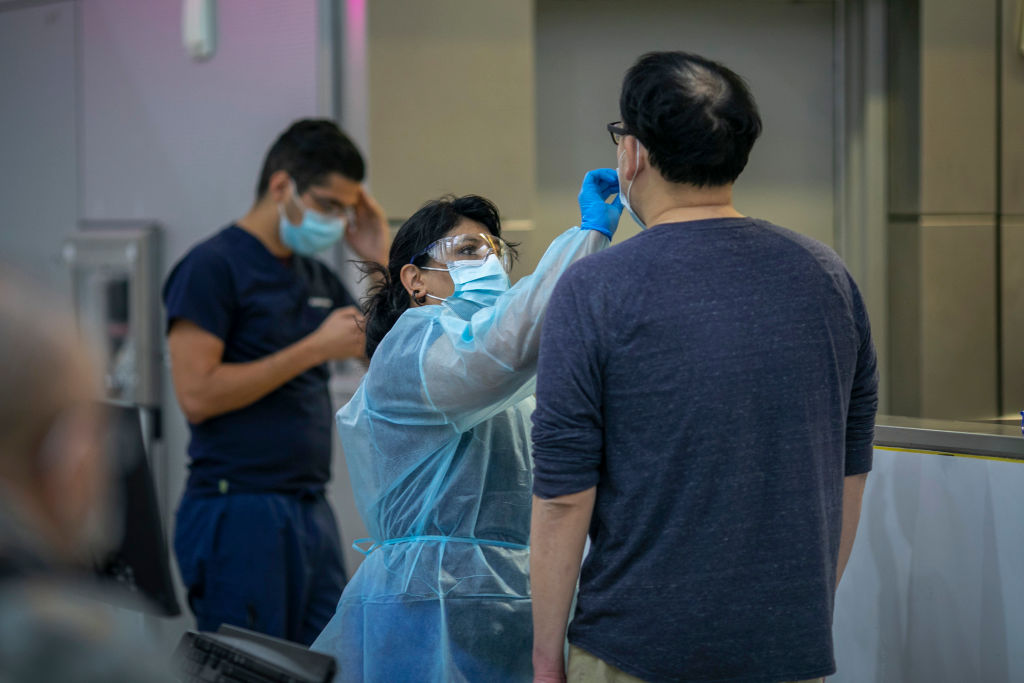Citing soaring COVID-19 cases and hospitalizations, Los Angeles County imposed tightened health restrictions Monday, including a ban on most gatherings and strict capacity limits on most businesses, while forcing closures of playgrounds and card rooms.
But the restrictions were met with pushback from some residents, business owners and elected officials -- including the Lancaster City Council, which will hold a special meeting this week to consider a "no-confidence" vote in county Public Health Director Barbara Ferrer and discuss creating a municipal health department.
A handful of residents even staged a protest outside Ferrer's Echo Park home on Sunday, challenging the need for strict health orders.
Ferrer, however, pointed to continued alarming numbers of new coronavirus cases and hospitalizations as necessitating the new restrictions, saying the virus "is running rampant through almost every part of our county."
"Contrary to the sentiments expressed by some, many of these cases could have been prevented if individuals and businesses were following the straightforward public health measures of masking, distancing and infection control," she said. "As we're all seeing, when even relatively small numbers of businesses and individuals fail to adhere to sensible precautions, many others experience the consequences of these lapses.
"We are at the most difficult moment of the pandemic. But we're aware there are many that are tired of repeated requests to sacrifice and others that are unhappy and frustrated with the latest safety modifications, particularly those modifications that have had a detrimental impact on businesses and their employees. We don't really have any choice but to use all the tools at hand to stop the surge. Until there's a vaccine, each of us needs to protect all of those around us."
The new "Health Officer Order" that took effect Monday bars all public and private gatherings with people of multiple households, except for constitutionally protected outdoor church services and protests. It also sets occupancy limits at various businesses, while also mandating face coverings and six feet of physical distancing.
The capacity limits are:
-- essential retail: 35% maximum occupancy;
-- nonessential retail (includes indoor malls): 20% maximum occupancy;
-- personal care services: 20% maximum occupancy;
-- libraries: 20% maximum occupancy;
-- fitness centers operating outdoors: 50% maximum occupancy;
-- museums galleries, zoos, aquariums, botanical gardens operating outdoors: 50% maximum occupancy; and
-- mini-golf, batting cages, go-kart racing operating outdoors: 50% maximum occupancy.
The order allows most outdoor recreational facilities to remain open, including beaches, trails and parks. But face coverings are required. Also open are golf courses, tennis courts, pickleball, archery ranges, skate parks, bike parks and community gardens, but use is restricted to a single household at a time. Pools that serve more than one household may open only for regulated lap swimming with one person per lane. Drive-in movies/events/car parades are permitted provided occupants in each car are members of one household.
Schools operating with limited numbers of students and day camps can remain open, adhering to reopening protocols. Schools and day camps with an outbreak, defined as three cases or more over 14 days, should close for 14 days. Card rooms are closed, as well as playgrounds, except for those at child care centers and schools.
The restrictions will remain in effect until at least Dec. 20. The county last week put an end to all in-person dining at restaurants.
On Monday, the county reported another 5,150 confirmed cases of COVID-19 and another 17 deaths. The new cases pushed the county over the cumulative 400,000 mark in terms of case numbers, with the total rising to 400,919. Since the pandemic began, 7,655 people have died due to coronavirus-related causes.
The number of people hospitalized also continued to rise, reaching 2,185 on Monday. The increasing hospital numbers have health officials fearing a possible overwhelming of the health care system if the surge isn't reversed.
Ferrer noted that the average daily hospitalization number has increased by 93% over the past two weeks.
"Although currently we have adequate capacity at our hospitals and have extensive plans in place to take appropriate actions to manage these huge increases, a continued surge in cases is just not sustainable,'' she said.
She noted that the increasing hospital numbers also threaten health care workers. Ferrer announced another 747 cases of COVID-19 among health care workers on Monday.
"The very frontline workers that we rely on to care for us should we become ill are themselves now at increased risk of becoming sick," she said.
Despite the rising case numbers and hospitalizations, the stepped-up health orders were being met with resistance. The city of Pasadena, which has its own health department, hasn't fallen in line with all of the county's health restrictions, allowing in-person dining to continue for now. The city insisted that it is better equipped than the county to enforce health restrictions at eateries -- evidenced by crackdowns over the weekend that forced the closure of at least five restaurants due to violations of infection-control measures.
Lancaster city officials called a special City Council meeting for Thursday to consider a no-confidence vote in Ferrer -- even though the county's restrictions are technically issued by the county's Health Officer, Dr. Muntu Davis. The council will also consider asking its staff to begin outlining the process for creating a municipal health department, much like those in Pasadena and Long Beach.
Mayors of the cities of Commerce, Bell Gardens and Hawaiian Gardens held a news conference Monday calling on the county to allow continued outdoor operations at card rooms, which were closed under the newly enacted health order. Those cities fiercely lobbied the county earlier to allow the card rooms to open, noting that the operations account for up to 75% of the tax revenue generated in the small municipalities.
Restaurant owners also continue to balk at the decision to cut off in-person dining, saying they spent thousands of dollars to open outdoor patios and implement extensive safety protocols, only to have the rug pulled from under them. They also contend there is no evidence linking in-person dining to the current surge in virus cases.
County officials have countered that such dining is the only environment that allows people to spend extended amounts of time in relatively close proximity without masks.
The ban on in-person dining was triggered last week when the county met a five-day threshold of averaging more than 4,000 new COVID-19 cases per day. The new health restrictions that took effect Monday were triggered when the case numbers worsened, with the county reaching a five-day daily average of 4,500 new infections.
According to county estimates released last week, every COVID-19 patient in the county is passing the virus to an average of 1.27 people -- the highest transmission rate the county has seen since March, before any safety protocols such as face coverings and social distancing were in place.
Based on that transmission rate, health officials estimate one of every 145 people in the county are now infected with the virus and transmitting it to others.
Ferrer on Monday said she understands the frustration of residents and businesses, but she's hoping ``everybody gets on board'' with the new restrictions.
"This is three weeks. This is not forever,'' she said. "This is really to try to get us to make significant changes in the way we're behaving and interacting with each other."
She noted that roughly 9% of all tests done in the county over the past week have come back positive, up from less than 4% a month ago.
"We just have so many more people that are infected that for three weeks we're really asking people, please don't gather with people outside your household," Ferrer said.




